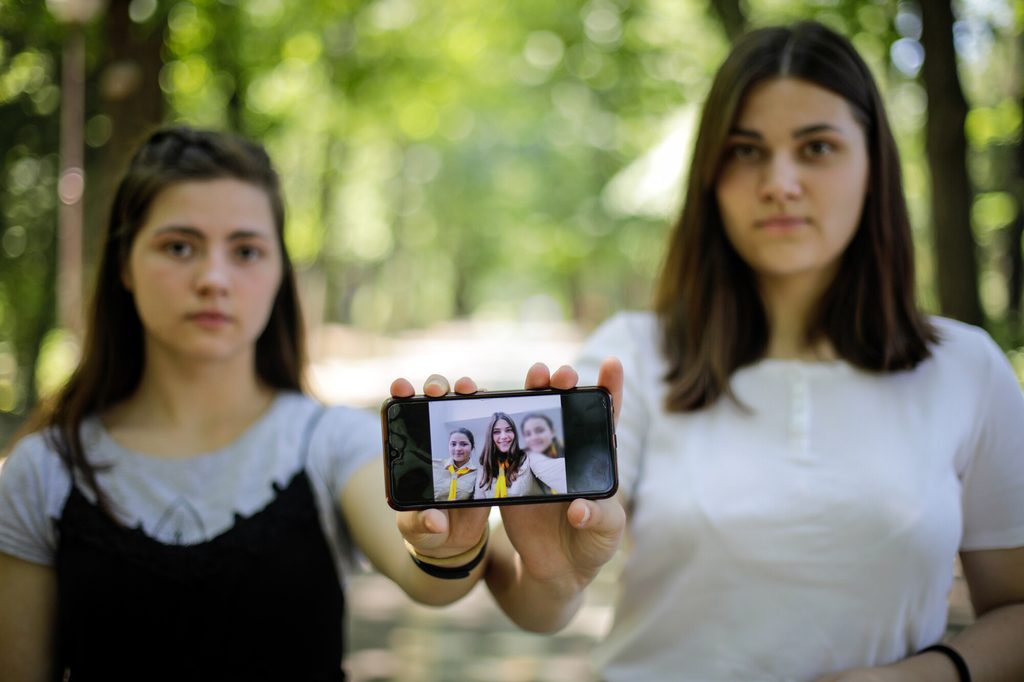Ukrainian teen refugees share images from home
22 August 2022Six months after the escalation of conflict in Ukraine, 5.8 million Ukrainians are now refugees. The vast majority are women and children. While some families have returned to their homes, others continue to flee as frontlines shift and food, gas, water and other essential supplies run out. Refugees from Ukraine are still arriving in neighbouring countries like Poland, Moldova and Romania each day.
Here, teenage girls now living in Romania share their memories from home, via the phones they use to keep in touch with friends and family.
My house – Ariana, 13
Arina, 13, fled Ukraine with her mother Iryna, 46, four months ago. They made the decision to leave so quickly, as bombs fell around them, that they had no time to even pack a change of clothes.
Arina’s father and brother remain in Ukraine. She and her mother now live in Bucharest, Romania’s capital, and share a home with another Ukrainian family.
A keen painter, she shares a painting of her home in Ukraine. When she and her mother first arrived in Bucharest, she created drawings and gave them to the volunteers as a gift for their work.
Arina explains that although safe from the fighting, she desperately misses her home in Ukraine: “No matter how good the situation could be here, it doesn’t matter because I miss my school, my friends, my activities – everything I used to do back home.”
“It’s about my emotions and feelings towards Ukraine and everything related to my life before coming to Romania. It could be better here than at home, but it doesn’t matter, I am still missing home and everything I had back home.”
Our sister – Alina, 21 and Yana, 19

Before the conflict, sisters Alina, 21 and Yana, 19, were university students in Bucha, a city just outside of Kyiv and one of the first places to be taken by Russian forces. When the war first broke out, Alina received a phone call from her mother in the early hours of the morning, urging her to come back home. But realising it was too late for them to make it home, they instead travelled to Romania in search of safety.
“It was very fast that we left. If we had stayed there one day or more, I don’t know what would have happened,” Alina explains.
For the past four months, the sisters have lived in Bucharest. They both work with Plan International’s partner, ADRA, creating fun, vibrant and safe spaces for children who have also fled the conflict in Ukraine. Along with the rest of their family, their 16-year-old sister has stayed behind in Ukraine, but photos like this bring them back together.
My dance team – Kateryna, 13
Kateryna, 13, fled Ukraine with her mother Tetiana, 44. They also left in terrifying circumstances, crossing first into Moldova before reaching Romania.
When they arrived, they were astonished by the warm reception they received from local people, which helped them to feel safe so they could start to process the events they had lived through.
Before the conflict, Kateryna used to travel across Ukraine to take part in dance competitions. She has loved traditional Ukrainian dancing since the age of three. With cash vouchers from Plan International, she has bought headphones so that she can carry on practicing dancing. Determined to carry on dancing when she is able to return home, she has been practicing by herself using YouTube, and stays in touch with her former teammates via the internet.
“I am not able to work with my team anymore, so I must do it by myself at home using YouTube to continue the work I was doing, and to practice my performance. Now I train by myself to make sure I will be fit when I go back to my team,” she explains.
“Everyone in my team has left Ukraine but we keep in touch via the internet.”
Over the last six months, Plan International has been working with partner organisations across Poland, Romania and Moldova to support refugee children from Ukraine and their families as they rebuild their lives and settle into a new country.
Child protection, mental health and psychosocial support, education and cash and voucher assistance are our priorities, alongside preparing for harsh winter conditions.
To date, we have reached at least 154,929 people with critical support.


